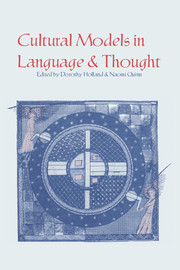Book contents
- Frontmatter
- Contents
- Preface
- List of Contributors
- Introduction
- Part I Presupposed worlds, language, and discourse
- Part II Reasoning and problem solving from presupposed worlds
- Part III The role of metaphor and analogy in representing knowledge of presupposed worlds
- 8 The cognitive model of anger inherent in American English
- 9 Two theories of home heat control
- 10 How people construct mental models
- Part IV Negotiating social and psychological realities
- Part V An appraisal
- Index
10 - How people construct mental models
Published online by Cambridge University Press: 05 June 2012
- Frontmatter
- Contents
- Preface
- List of Contributors
- Introduction
- Part I Presupposed worlds, language, and discourse
- Part II Reasoning and problem solving from presupposed worlds
- Part III The role of metaphor and analogy in representing knowledge of presupposed worlds
- 8 The cognitive model of anger inherent in American English
- 9 Two theories of home heat control
- 10 How people construct mental models
- Part IV Negotiating social and psychological realities
- Part V An appraisal
- Index
Summary
Analogies are powerful ways to understand how things work in a new domain. We think this is because analogies enable people to construct a structure–mapping that carries across the way the components in a system interact. This allows people to create new mental models that they can then run to generate predictions about what should happen in various situations in the real world. This paper shows how analogies can be used to construct models of evaporation and how two subjects used such models to reason about evaporation.
As Lakoff and Johnson (1980) have documented, our language is full of metaphor and analogy. People discuss conversation as a physical transfer: (e.g., “Let's see if I can get this across to you” (Reddy 1979). They analogize marriage to a manufactured object: (e.g., “They had a basic solid foundation in their marriages that could be shaped into something good” (Quinn this volume). They speak of anger as a hot liquid in a container (Lakoff & Kövecses this volume); and they describe their home thermostat as analogous to the accelerator on a car (Kempton this volume).
Why are analogies so common? What exactly are they doing for us? We believe people use them to create generative mental models, models they can use to arrive at new inferences.
Information
- Type
- Chapter
- Information
- Cultural Models in Language and Thought , pp. 243 - 266Publisher: Cambridge University PressPrint publication year: 1987
Accessibility standard: Unknown
Why this information is here
This section outlines the accessibility features of this content - including support for screen readers, full keyboard navigation and high-contrast display options. This may not be relevant for you.Accessibility Information
- 88
- Cited by
